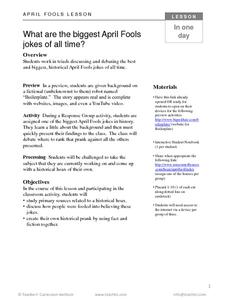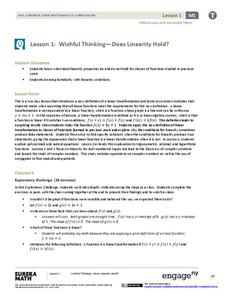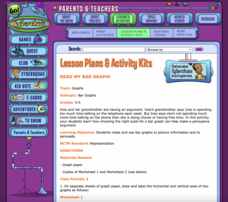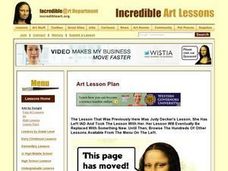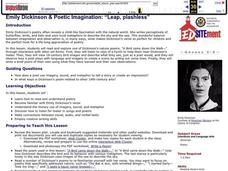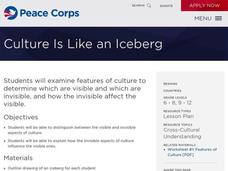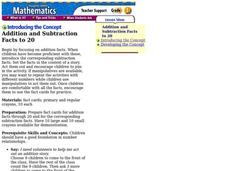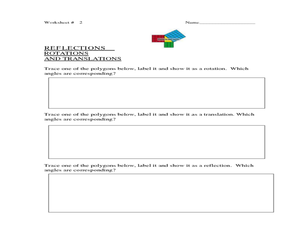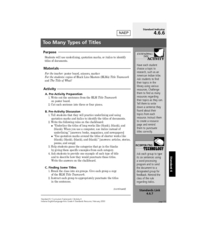American Chemical Society
Exploring Baking Powder
Meant to follow an activity in which young chemists identified an unknown substance by chemical reactions, they now take their data and use it to determine which materials combine to make up baking powder. This lesson is one that can be...
Federal Reserve Bank
The Fed Is Protecting Your Money
A dollar bill, a check, a credit card, and... a cow? What exactly are the various forms of payment that exist today? Your learners will identify the three functions of money in this lesson. In addition, they will discover the most common...
TCI
What Are the Biggest April Fools Jokes of All Time?
After working in groups to analyze primary sources related to a historical hoax, learners will discuss how people managed to be fooled and work to identify one of the biggest April Fools jokes in history.
EngageNY
Wishful Thinking—Does Linearity Hold? (Part 1)
Not all linear functions are linear transformations — show your class the difference. The first instructional activity in a unit on linear transformations and complex numbers that spans 32 segments introduces the concept of linear...
Virginia Department of Education
Inductive and Deductive Reasoning
Introduce pupils to the two types of reasoning, inductive and deductive. Classmates work in pairs or small groups to learn the difference between the two and apply these reasonings to develop valid conclusions.
Social Media Toolbox
Reporting with Social Media
What does it take to create news stories that are both informative and objective? Aspiring journalists walk the line between engagement and activism with lesson 15 of a 16-part series titled The Social Media Toolbox. Grouped pupils...
Curated OER
Read My Bar Graph!
Elementary schoolers make and use bar graphs to picture information. They learn how choosing the right scale for a bar graph can help make a persuasive argument. This is a terrific lesson on graphing which should excite your kids. There...
Curated OER
Paper Maché Mancala Game Boards
Seventh graders create three dimensional works of art from two dimensional plans, develop skills in papier-mach?? technique, utilize elements and principles of design to create 3-D form, and develop math/strategy skills in playing the...
Curated OER
M&M Graphing
Fourth graders name colors of M&Ms and record answers. They estimate number of M&Ms of each color found in a typical package of M&Ms on piece of paper.They record information on sheet of paper and create a spreadsheet. paper.
Curated OER
Solid Waste and Recycling
Young scholars demonstrate effects of waste on environment and ways of reducing it, observe how much packaging goes into bag lunches each day, and survey their families to assess awareness levels and household recycling practices....
Curated OER
"Leap, Plashless": Emily Dickinson & Poetic Imagination
Students read and explore one of Emily Dickinson's nature poems, "A Bird Came Down the Walk-" through interaction with a variety of art forms. Clips of a hymn to hear meter and the viewing of bird images exposes them to the language and...
Curated OER
Pictures in Words: Poems of Tennyson and Noyes
Students examine how Tennyson and Noyes use words to paint vivid pictures. They read and analyze two poems, complete an online scavenger hunt, complete a worksheet, and write examples of alliteration, personification, metaphor, simile,...
Curated OER
Culture is Like An Iceberg
Young scholars examine the different features of culture. They determine which features are visible and invisible. They describe how the two types affect each other.
Curated OER
After I Read Strategy Sheet
After readers finish the story Deep-Sea Monster, they utilize this two-page worksheet to write short-answer responses to questions about the story. The questions posed require critical thinking, not simply recalling details from the...
Houghton Mifflin Harcourt
Addition and Subtraction Facts to 20
First graders act out number stories from number cards. In order to learn about addition and subtraction up to 20 lesson, learners become the manipulatives and line up to show the number stories.
Houghton Mifflin Harcourt
Songwriting Skill - Finding Your Voice: The Academy Is - “About A Girl”
The seventh in a series of nine exercises focusing on songwriting models for young lyricists on how to find and develop their unique voice. Class members suggest songs that they feel sound authentic and contrast the wording with songs...
Curated OER
Write Some Dialogue
Students write dialogue. For this character development lesson students use direct or indirect speech to include a confrontation between two characters in their story. Students portray the emotions of the characters in addition to what...
Curated OER
Point Comparisons
Young geometers investigate two-dimensional figures using coordinate grids. They identify polygons and draw examples of their reflection, rotation, and translation on a coordinate grid. And they complete a worksheet practicing examples...
School City of Hobart
Too Many Types Of Titles
Direct instruction on punctuation rules for titles is followed by collaborative practice in class. Two worksheets with aesthetically engaging graphic design provide practice. For 12 examples, small groups either underline, italicize, or...
Curated OER
Fact Or Opinion
Groups of junior highers find newspaper articles which contain both facts and opinions, and present examples of each to the class. The focus is on discerning between fact and opinion. Two excellent worksheets are embedded in the plan...
Curated OER
Writing: Mentor Text Lesson & Microteaching
Mentor texts are a great way to demonstrate how to write with purpose. Pupils will be reintroduced to two well-known books and then asked to think about them from the writer's point of view. They will see that the author had to use basic...
Curated OER
Satire and The Adventures of Huckleberry Finn
Does Mark Twain’s satire become sarcasm and does he cross the line of propriety in The Adventures of Huckleberry Finn? As an introduction of satire, class members view an excerpt from The Daily Show and discuss Stewart's use of this...
Curated OER
Take a Deep Breath: Air Today, Air Tomorrow
This is the introductory lesson in a series about air quality. Why is it so important that we breathe clean air? How can we make sure we're keeping our air clean? A discussion is the central idea of the lesson, and example questions are...
Curated OER
The Adventures of Tom Sawyer: "Chalk Talk Strategy”
Hold a silent discussion about concepts related to The Adventures of Tom Sawyer. After reading chapter seven, learners participate in a whole-class written discussion based on guiding questions written on the board by the teacher.
Other popular searches
- Fractions Number Lines
- Rounding With Number Lines
- Double Number Lines
- Fraction Number Lines
- Intersection of Two Lines
- Addition With Number Lines
- Using Number Lines
- Metric Number Lines
- Number Lines and Fractions
- Decimals on Number Lines
- Basic Number Lines
- Labeling Number Lines




